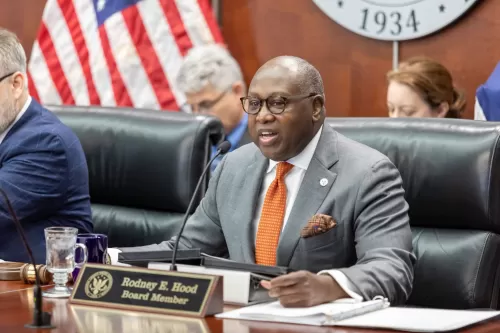NCUA Board Member Rodney E. Hood during a meeting of the NCUA Board.
As Prepared for Delivery on October 19, 2023
I'd like to begin by expressing my appreciation to Chairman Harper for presenting this matter before the Board and doing so in an open meeting rather than through a notation vote.
As a member of the NCUA Board, my primary responsibility is to safeguard the safety and soundness of the credit union system. Yet, where appropriate, and as I have said on numerous occasions, I believe it is essential for regulators to look for ways to better address the needs of the credit union industry and the local communities in which they serve. In this regard, I previously championed the Second Chance IRPS, which we considered in 2019 during my tenure as Chairman. I am delighted to see this notice of proposed rulemaking aimed at codifying many of the provisions we introduced in that statement.
As many as one in three Americans carry some form of a criminal record. However, a significant portion of these individuals pose minimal risk to our society. However, having faithfully paid their debt to society, many of these individuals continue to confront barriers to secure gainful employment and provide a positive economic impact on their communities. This perpetuates a cycle of underemployment, depriving them of economic mobility and prosperity.
As I have said before, these individuals represent an untapped economic resource, particularly in today's competitive labor market, where it’s become difficult for employers to find available qualified candidates. Nevertheless, many individuals still struggle to find employment even after taking responsibility for past indiscretions. Regrettably, hiring practices often lack compassion, leading to the rejection of otherwise qualified applicants based on long-ago convictions for minor offenses.
One of the core tenets of our national identity is the belief that America offers a second chance, a place where individuals can make a fresh start. The proposed rule before us today will do just that. It provides further regulatory relief than what was introduced by the Second Chance IRPS by expanding the exceptions to the employment restrictions under Section 205(d) of the Federal Credit Union Act, excluding expunged and sealed offenses, reducing restrictions on old misdemeanor convictions, and on convictions involving controlled substance possession.
This proposed rule under consideration today represents more than just regulatory relief. It embodies a commitment to what is morally right.
I do have some questions:
- Pam, you mentioned during your remarks that this NPR codifies many of the elements of IRPS 19-1. For people to understand any difference that exists, can you explain the main differences between the NPR and the second chance IRPS we introduced in 2019?
- I know we had a lot of valuable information in the second chance IRPS that credit unions should know and found very helpful. If the rule is adopted and becomes final, are we planning on providing any additional guidance about Section 205(d) separate from the rule to maintain the information we introduced in the IRPS?
- I wholeheartedly support this notice of proposed rulemaking.




